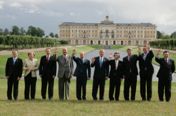July. Back to school fuss and first–day nervousness. A newcomer, in a dubious manner has joined the best class in school and with persistence has been trying to prove that the superficial merits showed when joining the team are actually factual.
This is exactly what happened this year at the G8 Summit.
Russia, the Eastern “sovereign democracy” as Putin put it, has hosted the yearly meeting of the club of the world’s most industrialised and developed economies. With a renewed self-confidence and oblivious to external criticisms the Russian host, on his side, ensured that the whole range of activities, starting from friendly photo-shoots to the short of substance meetings, will create a boost to his and Russia’s image, thus portraying that a former superpower is back on track again.
The encounter’s scope was to tackle and synchronize the G8 countries’ positions on the most burning issues of economic or political nature. Consequently, the concrete output in form of non-binding decisions or, more simply put, trusting leaders’ word of honour, is expected by society to be translated into action.
Once again new promises have been made leaving issues such as climate change aside and Africa down after big commitments in 2005.
That apart, the most striking argument arises when it comes to the criteria applied to Russia when it became a formal member of the club. A club that fosters the strengthening of democracy, human rights and the rule of law around the world suddenly has, after few energy supplies crisis, widely opened its arms and welcomed a Russia that is not democratic enough, is far from being called a rich country and that has had for decades problems with its neighbours. Apart from that, the basic human freedoms are severely breached by this country, making life for youth organisations and other NGOs unbearable and threatening their existence. Obviously, European leaders were fully aware of these facts, but lacking boldness at the negotiation table, took away any chance to strengthen and support an independent and pluralistic civil society in Russia.

A civil society that is not necessarily aligned with the government’s policies.
Putin ignores any criticism addressed at the Kremlin, and seems to rather play chess with oil prices and pipelines on the board. At the same time European leaders consciously close their eyes and soften their disapproval for Russia’s continuous breach of human rights and freedom of speech. A soft approach shall, in their hopes, convince Putin to eventually sign the Energy Charter Treaty, thus opening Russia’s energy markets and maybe providing large European energy companies with a slice of the tasty Gazprom cake. However, no one can guarantee that the ratification of the ECT by Russia will also mean its implementation.
Conclusion
All in all, results are more than disappointing.
As long as the EU doesn’t talk to Russia with one voice, there won’t be major changes. Russia is the EU’s biggest energy supplier and President Putin, being very much aware of this fact, will continue to use energy as a tool of foreign policy. A European Union that is divided in foreign affairs and does not dare to be sufficiently straightforward will remain helpless in its attempt to overcome dictatorships, regional conflicts and weak democracies on our continent.
At this instant, everyone has given their word of honour and has taken some responsibilities but I am more than eager to see those translated into reality!


Follow the comments: |
|
